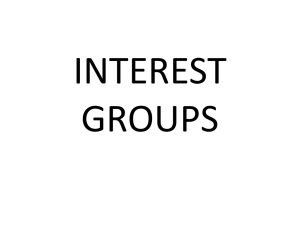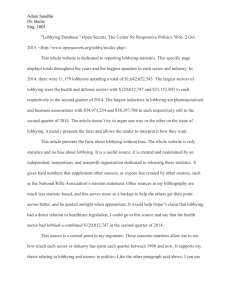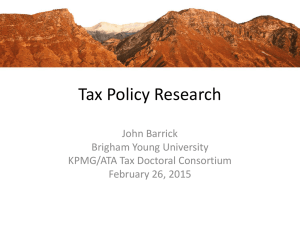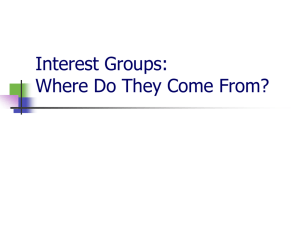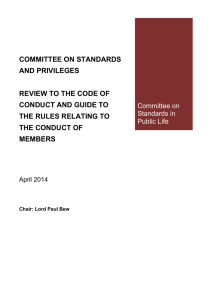U4BRIEF - U4 Anti-Corruption Resource Centre
advertisement
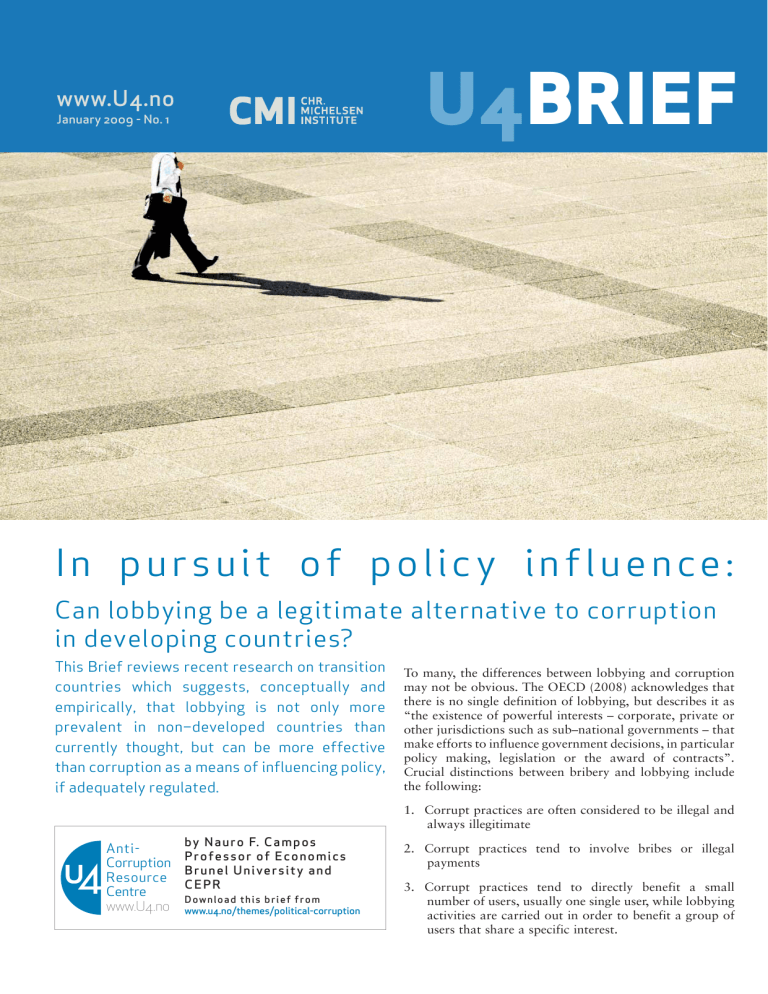
U4BRIEF www.U4.no January 2009 - No. 1 In p u r s ui t o f p olic y i n f lu e n ce : Can lobbying be a legitimate alternative to corruption in developing countries? This Brief reviews recent research on transition countries which suggests, conceptually and empirically, that lobbying is not only more prevalent in non–developed countries than currently thought, but can be more effective than corruption as a means of influencing policy, if adequately regulated. To many, the differences between lobbying and corruption may not be obvious. The OECD (2008) acknowledges that there is no single definition of lobbying, but describes it as “the existence of powerful interests – corporate, private or other jurisdictions such as sub–national governments – that make efforts to influence government decisions, in particular policy making, legislation or the award of contracts”. Crucial distinctions between bribery and lobbying include the following: 1. Corrupt practices are often considered to be illegal and always illegitimate AntiCorruption Resource Centre www.U4.no by Nauro F. Campos Professor of Economics Brunel University and CEPR Download this brief from www.u4.no/themes/political-corruption 2. Corrupt practices tend to involve bribes or illegal payments 3. Corrupt practices tend to directly benefit a small number of users, usually one single user, while lobbying activities are carried out in order to benefit a group of users that share a specific interest. How does lobbying differ in developed and transition countries? it is one form with which transition economies have had relatively long experience. Most of these associations existed under communism, although for different purposes and with very different roles and relevance. Pyle (2006) provides additional evidence that firms that are members of trade organisations systematically grow faster than those that are not. He reports that in addition to lobbying regional and national governments, trade associations are important for their members because of their assistance in attracting new investment, new technologies and finance as well as encouraging the interchange of technical information. Lobbying in developed countries is a highly heterogeneous activity. In their quantitative overview of lobbying regulations in the USA, Canada, Germany, and the EU, Chari, Murphy and Hogan (2007) observe important differences even across developed countries. For instance, lobbying in the United States behaves like an industry with established firms operating very much under careful judicial scrutiny with explicit disclosure requirements. In the United Kingdom the lobbying sector is a Although Russia is likely a more informal affair, unique case, the transition taking many different “the stronger the rules in place governing lobbyists, economies as a group offer forms and involving a fertile ground on which to the more accountable the political system” much larger and varied test the relative importance set of users. For example, of lobbying and corruption the UK’s government is as mechanisms to influence an important client, while that is not the case in the US. political agendas. This set of countries’ political and The authors find that, in highly regulated jurisdictions, economic systems were very similar until the collapse of regulations helped ensure accountability in government communism in 1989. Afterwards, they followed different than in less regulated environments. Therefore, the stronger strategies of political and economic reform, with many the rules in place governing lobbyists, the more accountable becoming fully–fledged democracies and members of the political system is believed to be. the European Union (e.g. Hungary and Poland), while Given the diversity of lobbying across North America others experienced heavy economic turmoil and limited and Europe, one should expect the variety of lobbying improvement in terms of political rights and civil liberties, experiences in the rest of the world to be even wider. Yet, including freedom of association (e.g. Turkmenistan and we still know little about lobbying in developing countries. Belarus). Moreover, many of these countries are perceived Indeed, the sparse evidence we do have originates from as highly corrupt so it is valuable to investigate how transition economies.1 In general, this group of countries lobbying would fare vis-à-vis corruption in influencing has stronger institutional frameworks as well as better policy in such contexts. organised civil societies than Sub-Saharan Africa, the Middle East, and North Africa. Thomas and Hrebenar (2008)2 identify five major characteristics of interest groups in Argentina, India, China, Lithuania, Czech Republic, South Africa, and Tanzania: 1. Authoritarian leadership in most of these countries significantly restricted freedom of association, which affected both the vitality and the forms taken by lobbying in such countries 2. In these countries, special interests groups are often viewed as illegitimate 3. Informal groups are the norm as opposed to associational interests 4. Strategies and tactics are less formalised 5. Interest groups are normally less significant vehicles of political representation than political parties. Therefore, the level of institutional development and its recent history are central to understanding lobbying in these countries. Albeit not a developing country, Russia provides an interesting example when it comes to the role of lobbying in general and of trade associations in particular. Frye (2002) presents evidence that membership in a Russian business association is strongly associated with success in influencing legislation at the regional and local levels. Although it remains unclear whether membership in such associations is the main form lobbying takes in transition countries, The evidence: does lobbying influence policy in transition countries? New research (Campos and Giovannoni, 2007 and 2008) has explored whether and how extensive lobbying affects the political decision–making process vis-à-vis corruption and whether firms benefit economically from membership in such associations. The analysis of Campos and Giovannoni (2007) focuses on two main questions: 1. What are the factors that determine the likelihood of a firm being a member of a lobby group? 2. What is the relative role of corruption and lobbying in explaining the probability of a firm’s influence in terms of government laws, regulations, and policies? In this work, lobbying is defined as whether or not the firm is a member of a trade association or lobby group, while corruption is defined as whether or not the firm pays 10 per cent or more of its revenue in unofficial payments to public officials per annum. Concerning political influence, business firms were asked how influential they have been in affecting the content of any new laws, rules, regulations or decrees that could have a substantial impact on their businesses. Importantly, they also answered this question about influence in relation to four spheres: the executive branch, the legislative branch, the ministries, and the regulatory agencies. Using 1999 survey data for about 4000 firms in 25 transition economies, Campos and Giovannoni (2007) show that lobbying is an important alternative instrument of political influence vis-à-vis corruption in such countries. Their analysis also suggests that political institutions have a significant effect on the ability of lobbying to be used as a tool for influencing policy. In particular, they find that lobbying is systematically more prevalent in parliamentary systems. Investigating the profile of firms that are members of lobby groups, they find that the number of full–time workers (firm size), whether the firm is foreign-owned, the level of economic development, and political stability have a significant and positive impact on the decision to join a lobby group. Next steps towards informed development policy Research is still necessary in order to understand lobbying in developing countries (understanding the forms, relative effectiveness, actual workings of lobbying, and corruption in such countries). Furthermore, there is a need to compare lobbying and corruption as this area of research is new, under–investigated, and focuses on limited sets of countries. The findings presented above suggest that more institutionalised forms of exerting political influence tend to be associated with further consolidation of the democratic process and with tangible economic benefits to the firms that engage in lobbying activities. Yet these results come mostly from transition economies and refer to commercial enterprises. Finally, Campos and Giovannoni study the “the effect of lobbying on policy is always relative effects of lobbying and corruption in terms of statistically significant, while corruption seldom is” In order to substantiate the the production of political policy implications that such influence in four different findings support, it seems public sector spheres: urgent to learn more about executive, legislative, ministries, and regulatory agencies. lobbying in developing countries. Particularly, it is necessary First, they find that the effect of lobbying on policy is always to learn more about the types of lobbying activities and statistically significant, while on corruption it seldom is. actors other than trade associations, such as the role NGOs Second, and most important, the effect of lobbying on play in this regard. It would also be relevant to learn more political influence is much greater than that of corruption. about the types of strategies and tactics used by lobbying These findings support the notion that lobbying seems to be groups in developing countries. For example: a considerably more effective way than corruption for firms 1. The role of campaign contributions versus informational to exert political influence. advertising campaigns on specific issues in which the Campos and Giovannoni (2008) extend this work in lobbying group is perceived to have special knowledge substantial ways. They delve deeper into the different determinants of lobbying and corruption with emphasis on 2. The benefits such groups generate for their membership and the public at large a more comprehensive set of political institutions. They also go beyond political influence to investigate whether lobbying 3. The costs of lobbying activity in terms of the steering of and corruption affect the actual growth of business firms. policy towards groups with better access to policy-makers Using 2002 survey data for about 6000 firms in 26 transition to the detriment of less articulated groups in society. countries, their results suggest that lobbying and corruption are fundamentally different. The research also reinforces the previous study’s findings that political institutions play “anti–corruption efforts should be a central role, and that older, larger and foreign–owned enterprises are more likely to engage in lobbying. Taking premised on better knowledge about the these into account, they find that firms that favour lobbying practice of lobbying” tend to be in countries that are less politically unstable, more democratic, likely to be federal states, have a more independent media, and have experienced more changes in political leadership. In presidential systems, firms are more The latter is an important issue because groups other likely to join lobbying groups where the president has fewer than trade associations normally target specific spheres of de jure and de facto powers. government in particular ways that may differ from cases in which such activities are fostered and carried out by firms Campos and Giovannoni (2008) also find that lobbying is or commercial enterprises. more effective as a means of influencing policy where the electoral system features closed lists and smaller electoral To date, development partners have demonstrated little districts. Crucially, the significant determinants they find for interest in lobbying. Recent evidence from transition corruption are essentially the same but carry opposite signs. economies shows that lobbying can decrease incentives for For example, they find that corruption is more prevalent political corruption. Therefore, any anti–corruption efforts when the electoral system does not feature closed lists should be premised on better knowledge about the practice and has larger electoral districts. Finally, they put forward of lobbying in partner countries (maybe working with evidence that lobbying is a much more effective instrument chambers of commerce or established lobbying groups). In than corruption for exerting political influence and that addition, where lobbying activities exist, support may be lobbying is also a much stronger explanatory factor than needed to establish regulatory frameworks so that it is clear corruption for firm performance, even in countries often who can exercise influence on decision makers, through perceived as highly corrupt. which legal means, and whether and how this information should be disclosed. All views expressed in this brief are those of the author(s), and do not necessarily reflect the opinions of the U4 Partner Agencies. (Copyright 2009 - CMI/U4) www.U4.no References • Campos, N. and F. Giovannoni (2007), “Lobbying, Corruption and Political Influence,” Public Choice 131(1):1– 21 U4 - CMI PO Box 6033 5892 Bergen, Norway Tel: +47 55 57 40 00 U4@U4.no • Harstad, B. and J. Svensson (2008), “From Corruption to Lobbying and Economic Growth,” Northwestern University, mimeo, May • OECD (2008), “Lobbyists, Governments and Public Trust: Building a Legislative Framework for Enhancing Transparency and Accountability in Lobbying,” OECD: Paris • Campos, N. and F. Giovannoni (2008), “Lobbying, Corruption and Other Banes,” London, CEPR Discussion Paper 6962, September • • Chari, R., G. Murphy, and J. W. Hogan (2007), “Regulating Lobbyists: A Comparative Analysis of the USA, Canada, Germany and the European Union,” The Political Quarterly 78(3):422–438 Pile, W. (2006), “Collective Action and Post-Communist Enterprise: The Economic Logic of Russia’s Business Associations,” Europe-Asia Studies 58(4):491–521 • Commission of the European Communities (2006), “Green Paper: European Transparency Initiative” (http://ec.europa. eu/commission_barroso/kallas/doc/com2006_0194_4_ en.pdf, retrieved as of 14.10.08) Thomas, C. and R. Hrebenar (2008), “Understanding Interest Groups, Lobbying and Lobbyists in Developing Democracies,” Journal of Public Affairs 8 (1-2):1–14 Endnotes • 1 • Coates, D., J. C. Heckelman, and B. Wilson (2007), “Determinants of Interest Group Formation,” Public Choice 133 (3–4):377–391 Transition economies are understood as countries emerging from a socialist-type command economy towards a market-based economy. Examples include countries in the Eastern European region. 2 • • Council of Europe (2008), “Corruption and Democracy: Political Finances, Conflicts of Interest, Lobbying and Justice”, Council of Europe Publishing Frye, T. (2002), “Capture or Exchange? Business Lobbying in Russia,” Europe-Asia Studies 54(7):1017–1036 Thomas and Hrebenar (2008) is the introductory paper of a special issue of the Journal of Public Affairs which contains articles on lobbying in each of these developing countries. Photo by wulfmachine at: http://www.flickr.com/photos/wulfmachine/


